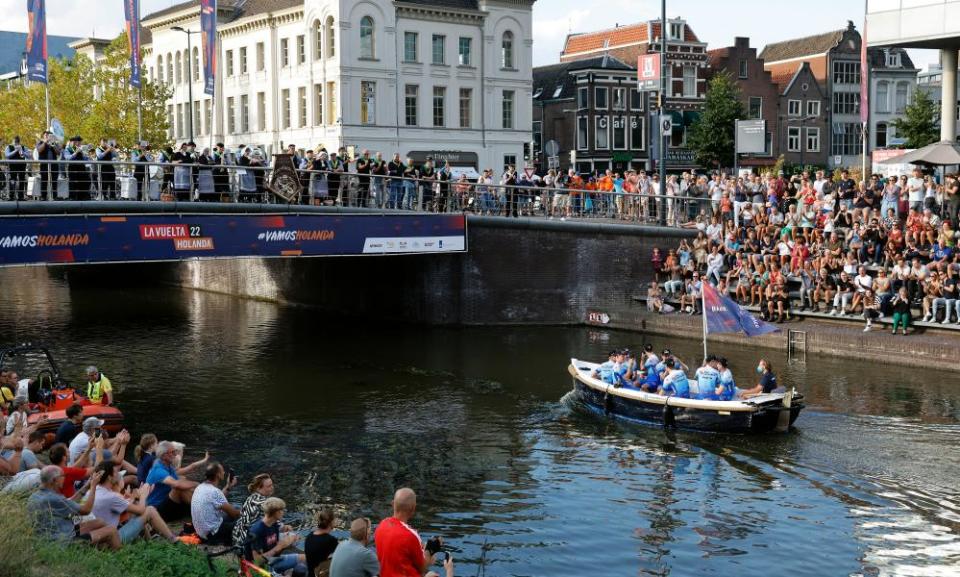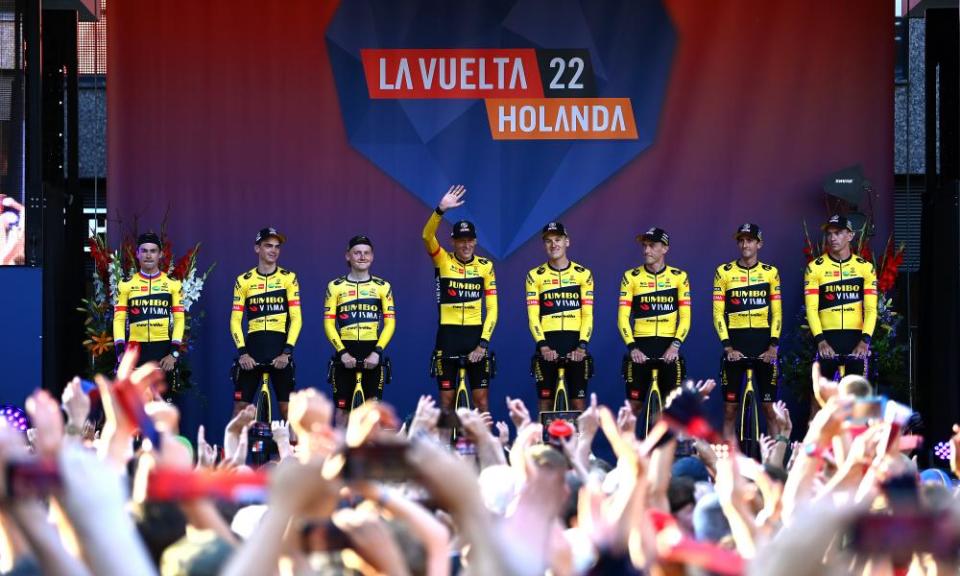Former winners and new contenders gear up for strongest Vuelta in years

A shadow was cast over the Vuelta a España by Thursday’s withdrawal of Nairo Quintana as the Colombian prepared his appeal against a positive test for the painkiller tramadol during the Tour de France, but even without the 2016 race winner, the final Grand Tour of 2022 is set to be contested by the race’s strongest field in recent years.
The unexpected return of the triple winner Primoz Roglic after his crash in the Tour de France means there will still be five previous winners in the field when the race begins in Utrecht on Friday – Alejandro Valverde (2009), Chris Froome (2011, 2017), Vincenzo Nibali (2010) and Lancashire’s Simon Yates (2018) being the others – along with three recent winners of the Giro d’Italia: the Londoner Tao Geoghegan Hart, his Ecuadorian Ineos teammate Richard Carapaz and the Australian Jai Hindley.
Related: Nairo Quintana disqualified from 2022 Tour de France after tramadol positive
When the Vuelta was relocated to its present late-season slot 27 years ago, the intention was that it would complete the year’s stage racing narrative by providing an opportunity for revenge or redemption for those who had missed the Tour or had fallen short. The world champion, Julian Alaphilippe, forced out of the Tour by injury, and his fellow Frenchman Thibaut Pinot – whose Tour was good but not great – fall into that category, as does the Irish sprinter Sam Bennett, who has looked increasingly marginalised at Bora-Hansgrohe this season.
As the most talented riders appear in the World Tour at a younger age, the Vuelta is also seen as the best place for the big teams to blood new prospects, as was the case with Tom Pidcock in 2021. The precocious Belgian Remco Evenepoel is not riding his first Grand Tour but unlike with last year’s Giro, he has managed a proper buildup; Ineos’s quartet of the Australian Luke Plapp, the Britons Ben Turner and Ethan Hayter, and the Spaniard Carlos Rodríguez are all between 21 and 23 and worth watching.

Youngest of all is the Spaniard Juan Ayuso, who is not yet 20; trivia lovers will appreciate the fact he was still in nappies when the 42-year-old Valverde – riding what he swears is his final Vuelta – made his debut in the race in 2002.
What awaits them is a race that continues the recent trend of fewer and shorter time trials, and more and steeper uphill finishes. The first three days in the Netherlands – before a transfer to Spain on Monday – are as flat as it gets, although Bennett will get at least five possible chances at a stage win that would salvage a frustrating season for the 2020 Tour de France points winner.
Nine of the 21 stages have difficult uphill finishes, beginning on stage six in the Basque country at Pico Jano, followed 48 hours later in Asturias by the monstrous Laviana, with its 17% slopes; the highest comes on the penultimate Sunday in the Sierra Nevada, topping out at more than 2,500m. There is a single individual time trial, at Alicante midway through, and a final bout of climbing in the Sierra de Guadarrama on the last Saturday.
It’s the same formula as in recent years and it has worked well for Roglic in the last three editions, although the Slovenian’s form is impossible to gauge as he has not raced since quitting the Tour. On the other hand, Yates has shown well recently, winning the Vuelta Castilla y León in late July, while Hindley and the Portuguese João Almeida looked strong in the recent Tour of Burgos.
A further twist in the Vuelta tale is cycling’s first relegation battle, with only 18 teams due to qualify for next year’s WorldTour. The next three weeks look vitally important for as many as six teams, with Froome’s Israel-Premier Tech, the Belgians of Lotto Soudal, Valverde’s Movistar and Yates’s BikeExchange-Jayco among them, along with Cofidis of France and the American squad EF Education-EasyPost, who now more than ever need their climber Hugh Carthy to build on his third place overall of 2020.

 Yahoo Movies
Yahoo Movies 